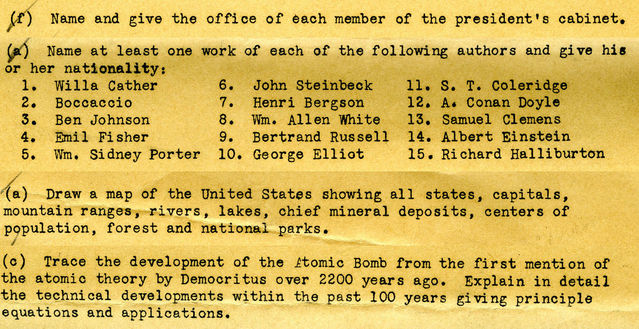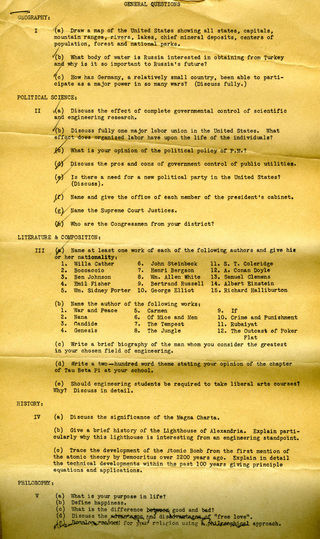Intelligence
The "Dumbing Down" of America: Real or Not?
Millennials are ill-informed, say late-night comedians
Posted August 15, 2016
A staple of late-night comedy is having a camera crew pose simple questions to young people in the street and capture supremely ignorant answers. It’s your call whether this is funny, exploitative, or both. But such bits tie into some durable American credos: that people are stupid; young people are especially stupid; and we’re all getting stupider with each generation.
Obviously a comedy bit is not a scientific survey. We don’t know how many people the camera crew had to interview to get the clueless responses they used. But there have been plenty of legitimate surveys on public knowledge. They too often show shocking levels of public ignorance.
Let me offer my own scrap of anecdotal evidence. Not long ago I came across a college exam my father had saved. A member of the “greatest generation,” he studied mining engineering at West Virginia University. The exam’s math and science questions struck me as impressively difficult. (I was a physics major at MIT.) But the real surprise was a page of “general” questions. They covered current events and liberal arts material that engineering students of a state university in the 1940s were expected to know.

I think we can agree that most college-educated adults today would struggle to answer these questions. Is this then proof of the dumbing-down of America?
My guess is no. We understand that IQ tests reflect the culture of those who made them. A test made by upper-middle-class whites is likely to report that affluent whites do well, while Latinos or blacks or poor people score lower. Cultures also change through time. The culture of the 1940s is not that of 2016; nor are parents’ cultures quite the same as those of their own children. Ignoring this can lead to the misperception that America is dumbing down.
Find a 2016 college exam, hop in a time machine, and go back to the 1940s. Ask mid-century college students to answer the 2016 questions. They might not do so well, either. People today know different things than people knew in the 1940s.
It’s not just a matter of “new” knowledge replacing old. Candide is still relevant, read, and appreciated. Yet even such a timeless genius as Voltaire is receding in our culture’s rear-view mirror. In ages past every educated person knew a lot about Voltaire. Today you’re “smart” if you do.
Does this mean that being well-informed is all relative, and there are no absolutes, no canonical knowledge that everyone should know? That’s a question I explore in my book Head in the Cloud. The ready availability of the Internet has changed our relationship to knowledge. You can look up anything in seconds, and this makes a case for needing to store fewer facts in our heads.
Yet there are exceptions, and my father’s exam offers a couple of examples. Engineering students were expected to be able to name their congressperson and the members of the President’s cabinet. We should aspire to know these things now. A democracy cannot make wise decisions unless voters follow politics and current events and think about them. It’s beside the point that you can “look up the answers.”



